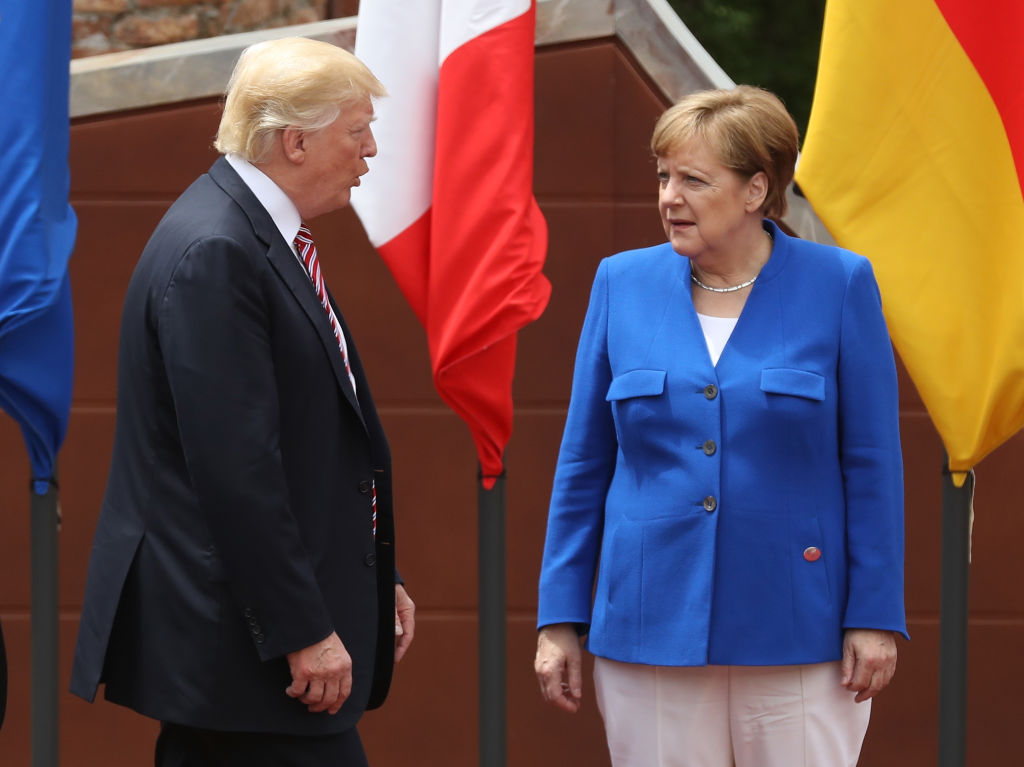Germany's Merkel is a 'convinced trans-Atlanticist' just speaking 'honestly' about U.S.-German ties, spokesman says


A free daily email with the biggest news stories of the day – and the best features from TheWeek.com
You are now subscribed
Your newsletter sign-up was successful
On Sunday, German Chancellor Angela Merkel sent a shiver through German-U.S. relations when she told a packed beer tent of her fellow Christian Democrats in Munich that from her experience at the G7 and NATO summits, "I can only say that we Europeans must really take our fate into our own hands — of course in friendship with the United States of America, in friendship with Great Britain, and as good neighbors wherever that is possible also with other countries, even with Russia." On Monday, her spokesman, Steffen Seibert, said Merkel was just being honest about differences with the Trump administration.
"The chancellor's words stand on their own — they were clear and comprehensible," Seibert said. Merkel is "a deeply convinced trans-Atlanticist," he told reporters in Berlin, and "those of you who have reported on the chancellor for a long time will know how important German-American relations are to her." Merkel will "continue to work to strengthen" this "firm pillar of our foreign and security policy," he said, but "because trans-Atlantic relations are so important to this chancellor, it is right from her viewpoint to speak out honestly about differences." President Trump and Merkel disagree on climate change and NATO commitments, among other things.
Merkel, who grew up in Soviet-controlled East Germany, has been a longtime supporter of the U.S. and backer of strong ties with the U.S., so her comments that Germany's ability to rely on the U.S. and Britain is "over to a certain extent" were seen as a blow to the post-World War II order. David Frum explained on Sunday that splitting apart Germany and the U.S. has been a key, long-term goal of the Soviet Union and then Russia under President Vladimir Putin, and argued that Trump just achieved what Russia has been unable to. "Putin could not have achieved out of this trip more exactly what he wanted if he'd been paying for it," he said. Watch below, or read his longer argument at The Atlantic. Peter Weber
The Week
Escape your echo chamber. Get the facts behind the news, plus analysis from multiple perspectives.

Sign up for The Week's Free Newsletters
From our morning news briefing to a weekly Good News Newsletter, get the best of The Week delivered directly to your inbox.
From our morning news briefing to a weekly Good News Newsletter, get the best of The Week delivered directly to your inbox.
A free daily email with the biggest news stories of the day – and the best features from TheWeek.com
Peter has worked as a news and culture writer and editor at The Week since the site's launch in 2008. He covers politics, world affairs, religion and cultural currents. His journalism career began as a copy editor at a financial newswire and has included editorial positions at The New York Times Magazine, Facts on File, and Oregon State University.
-
 Colbert, CBS spar over FCC and Talarico interview
Colbert, CBS spar over FCC and Talarico interviewSpeed Read The late night host said CBS pulled his interview with Democratic Texas state representative James Talarico over new FCC rules about political interviews
-
 The Week contest: AI bellyaching
The Week contest: AI bellyachingPuzzles and Quizzes
-
 Political cartoons for February 18
Political cartoons for February 18Cartoons Wednesday’s political cartoons include the DOW, human replacement, and more
-
 Nobody seems surprised Wagner's Prigozhin died under suspicious circumstances
Nobody seems surprised Wagner's Prigozhin died under suspicious circumstancesSpeed Read
-
 Western mountain climbers allegedly left Pakistani porter to die on K2
Western mountain climbers allegedly left Pakistani porter to die on K2Speed Read
-
 'Circular saw blades' divide controversial Rio Grande buoys installed by Texas governor
'Circular saw blades' divide controversial Rio Grande buoys installed by Texas governorSpeed Read
-
 Los Angeles city workers stage 1-day walkout over labor conditions
Los Angeles city workers stage 1-day walkout over labor conditionsSpeed Read
-
 Mega Millions jackpot climbs to an estimated $1.55 billion
Mega Millions jackpot climbs to an estimated $1.55 billionSpeed Read
-
 Bangladesh dealing with worst dengue fever outbreak on record
Bangladesh dealing with worst dengue fever outbreak on recordSpeed Read
-
 Glacial outburst flooding in Juneau destroys homes
Glacial outburst flooding in Juneau destroys homesSpeed Read
-
 Scotland seeking 'monster hunters' to search for fabled Loch Ness creature
Scotland seeking 'monster hunters' to search for fabled Loch Ness creatureSpeed Read
